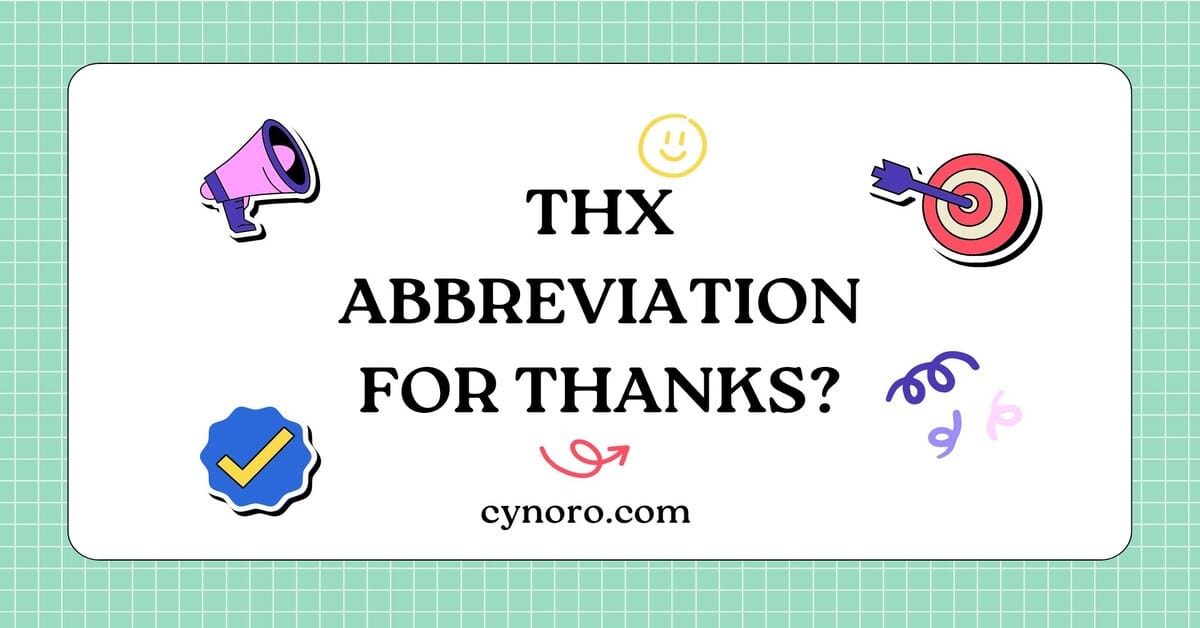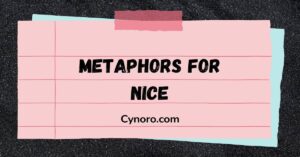Abbreviation for Thanks – You’ve likely seen it in texts, social media posts, or even emails: “Thx.” But why do we use it, and does it truly convey the same message as a full “thanks”? In today’s fast-paced world, people are constantly looking for ways to communicate more efficiently, and abbreviations like “Thx” have become a shorthand for expressing gratitude.
But is it always the right choice? In this article, we’ll explore the meaning behind “Thx,” when and where it’s appropriate, and how it has shaped the way we show appreciation in the digital age. Keep reading to find out how this tiny abbreviation packs a big punch!
Understanding the Abbreviation for Thanks
What is the Abbreviation for Thanks?
The abbreviation for “thanks” is “Thx”. It is a shorthand way of expressing gratitude, commonly used in texting, social media platforms, and even emails in informal contexts. While “Thx” is the most popular form, you might also encounter “Tks” or “TY”, especially in the context of quick, casual communication.
- Thx: Most common abbreviation, used in texting, casual chats, and social media.
- TY: Often seen in both texts and emails, commonly used when expressing a simple thank you.
- Tks: Less common, but still used in informal communication.
These shortened versions are a direct reflection of the growing need for efficiency in today’s digital communication.
Is “Thx” Widely Accepted?
Yes, Thx has gained widespread acceptance, especially in informal settings. Whether you’re chatting with friends or replying to a colleague on a messaging app, using “Thx” has become a common and accepted way of expressing gratitude. However, it’s important to note that while this abbreviation works well in casual interactions, it might not always be appropriate in more formal situations like professional emails or official business communication.
The Meaning and Significance of “Thanks”
What Does “Thanks” Really Mean?
At its core, thanks is a simple expression of gratitude. It’s a way to acknowledge someone’s effort, kindness, or help. The word itself has deep roots in human culture, reflecting our need to maintain social bonds and express appreciation. In different cultures, expressing thanks is not only about politeness but also about reinforcing the connection between individuals.
- Origin: The word “thanks” originates from Old English “thanc,” meaning thought, gratitude, or favor. Over time, it evolved into the term we use today.
- Emotional Significance: Saying “thanks” conveys warmth, recognition, and appreciation. It’s not just about politeness; it’s about fostering positive relationships.
Different Ways to Say “Thanks” in Different Contexts
While “thanks” is universal, the way we express gratitude can vary depending on the context. Here are some examples:
- Formal Contexts: In professional settings, you might say, “I sincerely appreciate your help,” or “Thank you very much for your assistance.”
- Informal Contexts: In casual conversations, “Thanks” or “Thx” might be more than enough.
- Cultural Differences: In some cultures, gratitude is expressed in more elaborate ways, while in others, simple phrases are preferred.
Why Abbreviate “Thanks”?
The Need for Speed: How “Thx” Became Popular
With the rise of digital communication—especially text messaging and social media—abbreviations like “Thx” have surged in popularity. People want quick, easy ways to express their feelings, and abbreviations help them do just that. As messages have become shorter and more informal, abbreviating “thanks” into “Thx” allows users to convey gratitude without spending extra time typing.
Here are a few reasons why people abbreviate thanks:
- Character Limits: Social media platforms like Twitter impose character limits on posts, making abbreviations like “Thx” convenient.
- Speed: Texting and instant messaging have become the preferred methods of communication, and people often choose brevity for efficiency.
- Casual Tone: Abbreviations match the informal, friendly tone of most online conversations.
The Rise of Texting Culture: Embracing Shortcuts
Texting, and now messaging apps like WhatsApp, Telegram, and Facebook Messenger, have made shorthand communication a norm. With the world moving toward fast-paced, instant communication, abbreviating words not only saves time but also helps to maintain the casual, conversational tone of many online interactions.
Proper Pronunciation and Usage of “Thanks”
How to Pronounce “Thanks” Correctly
Pronunciation might seem straightforward, but it’s not always clear-cut. Here are some key points to keep in mind when pronouncing “thanks”:
- The “th” sound in thanks can be tricky for non-native speakers. It’s a soft, unvoiced sound that requires placing the tongue lightly between the teeth.
- In some regions, people might shorten the “s” sound, making it sound like “thank.”
Mispronunciations are common, but as long as the word is understood, pronunciation may vary based on regional differences.
Using “Thanks” in Sentences: Practical Examples
Here are a few ways to use “thanks” in different contexts:
- Casual: “Thanks for the ride!”
- Formal: “Thank you for your assistance with the report.”
- Abbreviated: “Thx for the quick reply!”
- Professional: “I truly appreciate your time and effort, thank you.”
The Influence of “Thx” in Modern Communication
Shortened Abbreviations: Not Just for “Thanks”
Abbreviations aren’t limited to just “thanks”. As digital communication has evolved, a host of other shorthand expressions have emerged, including:
- TY (Thank You)
- TYVM (Thank You Very Much)
- LOL (Laughing Out Loud)
- BRB (Be Right Back)
Each of these abbreviations serves the same purpose: to convey meaning quickly and succinctly.
When to Use “Thx” Appropriately
While “Thx” is great for informal conversations, there are times when it’s better to spell out the full word, especially in professional settings. Here’s a breakdown of when to use “Thx”:
- Appropriate: Casual text messages, social media comments, quick acknowledgments.
- Inappropriate: Business emails, formal letters, professional communications.
If you’re in doubt, it’s always better to err on the side of formality.
Synonyms for “Thanks”
While “thanks” is a powerful word, there are many other ways to express gratitude, depending on the context and tone you want to set. Here are a few alternatives:
- Gratitude: Expresses a deeper, more sincere thankfulness.
- Appreciation: A formal way to acknowledge someone’s efforts.
- Cheers: Often used in informal settings, especially in the UK and Australia.
- Much appreciated: A more heartfelt version of thanks.
- Grateful: A way to express thankfulness, typically in a more emotional context.
Each of these synonyms conveys appreciation but can vary in tone and level of formality.
The Impact of Saying “Thanks”
Why Saying “Thanks” Goes Beyond Words
Expressing gratitude is more than just good manners. It’s a social tool that strengthens relationships, builds goodwill, and fosters positive emotions. Here’s why saying “thanks” is so important:
- Psychological Benefits: Studies show that expressing gratitude improves mental well-being, lowers stress, and even boosts happiness.
- Strengthening Relationships: A simple “thanks” can go a long way in making others feel valued and appreciated, strengthening both personal and professional relationships.
- Boosting Workplace Morale: In the workplace, regular expressions of thanks can improve morale, productivity, and collaboration.
The Power of Gratitude in the Workplace
In business settings, saying “thanks” is a key part of building a healthy organizational culture. Acknowledge your colleagues’ contributions, thank them for their time, and express appreciation for their help. This not only boosts morale but can also enhance team performance and satisfaction.
The History and Evolution of “Thanks”
Tracing the Origins of the Word “Thanks”
The history of thanks stretches back to Old English. The word “thanks” comes from the Old English “thanc”, which meant thought or favor. Over time, it evolved into its modern form, but its role in human society as an expression of gratitude has remained largely unchanged.
The Changing Use of Gratitude Over Time
As language and communication evolved, so did the ways we express gratitude. The introduction of written communication, such as letters, expanded the ways we could express thanks, while the advent of texting and social media has led to the rise of abbreviations like “Thx”.
Recognizing the Right Context for Abbreviations
When Should You Use “Thx,” “TY,” or “Thanks”?
Understanding when to use an abbreviation and when to spell out the full word is essential. Here’s a quick guide:
- Informal Settings: Text messages, social media posts, casual chats—“Thx” and “TY” are perfectly acceptable.
- Professional Settings: In emails, letters, and formal communications, it’s better to spell out “thanks” or “thank you” to maintain professionalism.
Final Thoughts on “Thanks” and Its Abbreviations
The abbreviation “Thx” has become a staple in digital communication, making it easier for people to express gratitude in a quick and efficient manner. However, it’s important to know when to use it and when to opt for a more formal expression of thanks. No matter how you say it, though, showing gratitude—whether in text or in person—remains an essential part of healthy, productive relationships.
By understanding the different ways to express thanks and the cultural and contextual significance behind each form, you can ensure that your communication remains both meaningful and appropriate for any situation.

Tony James is an expert blogger at Cynoro, specializing in the English language. With a passion for teaching and writing, he empowers learners to achieve fluency and confidence.








